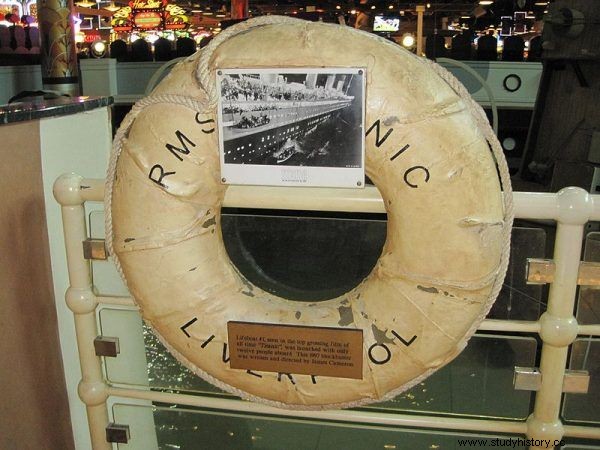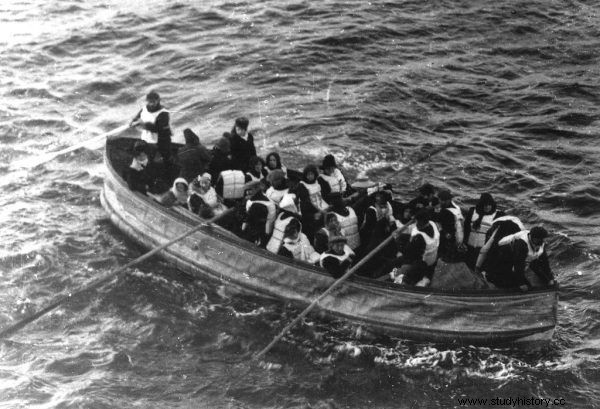The legendary ocean liner set off on its maiden voyage on April 10, 1912. Four days later, its passengers faced death deep in the freezing ocean. What were their chances of survival?
Suppose you are one of the lucky 2228 who earned a ticket to the maiden voyage of the RMS Titanic in 1912. You eagerly paid $ 300 (this is how much the pleasure would be worth today) for your third class and the privilege of accommodating two floors below the European elite on your way to America.
As you may have heard, the trip ended badly. When the ship hit the iceberg, passengers only had two hours to find lifeboats that were insufficient for everyone. In the third grade, less than half of the women and only 16 percent of the men survived the catastrophe . Being a third class passenger, you probably would not have made it to the lifeboat, instead you would have fallen into the Atlantic Ocean. What would happen next?
First contact with water
The salt in the ocean causes the water temperature to drop below freezing point. In the North Atlantic, where the Titanic sank, the water temperature was just below -2 degrees Celsius, and because the water is extremely skilled enough to lower your body temperature due to its thickness, you would find yourself in one of the most dangerous places to swim.

A replica of the Titanic lifebuoy, made for the film by J. Cameron.
You would be surrounded by particles crammed around you 800 times denser than just a few minutes ago aboard the Titanic, which would mean you would have chilled 25 times faster in water at -2 degrees Celsius than in air.
When you come into contact with water, your first reaction to such a sudden cooling will be to gasp. If your head goes below the surface, there is a risk of water getting into your lungs, which is dangerous no matter what the temperature is. So you have to keep your head above the surface of the ocean, at least initially (and really - best until the end, if you can).
Second, apart from the cold, you would probably get a headache. One of the first lessons in life we learn as children is the headache. When you drank your first shake you probably did it too fast and your brain froze . Or at least that's what you felt. In fact, something else happened:you froze a nerve in your palate.
When this happens, your brain reacts, although in truth it tends to overreact. He thinks that your whole head freezes, so in such situations it modifies your circulation and sends more much warmer blood to itself, which causes it to swell and creates the following problem:too much brain, too little skull. The result is an ice cream headache.
The same will happen if you find your bloodcurdling water (though this time your brain hasn't been fooled at all; it thinks it's freezing because it really is freezing). Warm blood will rush into your brain and it will swell and give you a sharp headache. Then you will experience a cold water shock for 30 seconds, and then you will start to hyperventilate. When it lasts too long, too much carbon dioxide is removed from the blood and acidity decreases.
Seizures or loss of consciousness?
If the acidity of the blood is too low, you run the risk of going unconscious - not a good thing when swimming. If you manage not to pass out, you will have an attack of muscle cramps - known as seizures. Shivering is nothing more than trying to warm yourself with the muscles that your body takes up. Roughly, the point is, if you don't start making jumpers, your body will do them for you.

Many of Napoleon's soldiers had cooled down during the retreat from Russia in 1812. Their fate was shared by the passengers of the Titanic.
Unfortunately, convulsions have a negative effect on the efficiency and function of the muscles - their coordination suffers. Nothing like this would have happened if you had been sitting at home waiting for you to warm up, but when you are neck-deep in the icy water, you need the help of your muscles to get out of trouble. It is difficult to do this when the muscles experience uncontrolled contractions and twitching.
Both shock and convulsions make up an overreaction, your body's wrong response to a stressful situation:flight or fight - which was developed in the course of evolution to keep you alive. It takes training to stop this reaction, but even if you have done it, there will be some psychological changes that you cannot avoid.
For starters, your arteries will contract so much that your heart will beat hard enough to push the blood through them . Meanwhile, your brain will reconsider priorities, withdraw warm blood away from your extremities, and redirect to vital organs.
Your limbs will go numb because the chemical processes in muscles and nerve fibers are most efficient at body temperature. As your nerves cool down, your muscles will lose strength, so your limbs will become numb. Your fingers will freeze because your brain has decided to sacrifice them for a good cause.

One of the lifeboats with drifting survivors. Most of the passengers weren't so lucky though.
Numbness in your hands and fingers will spread quickly, so after 15 minutes below freezing, you will begin to lose feeling in your entire arms and legs. Too bad if you want to swim. Most of those who died in the cold water did not die from hypothermia, but drowned. The same would happen to you if you didn't have a life jacket.
How long can you live?
The good news is that if you float, you can survive for a surprisingly long time. Even in icy water. This is not only because your body is a good insulating material, but also because you are really good at generating heat. Now you can turn on the heater to keep your body temperature at 37 degrees Celsius.
But when you fall into the water, which causes the blood to freeze in your veins, this value will start to drop, although it will be a little slower than you might imagine. You will have 30 to 60 minutes (depending on how well insulated you have) before your body temperature drops to 32 degrees.
Then you will pass out. This is not a very favorable circumstance for swimming in a freezing ocean, but assuming you continue to float and keep your head above the surface, you are still alive.

The article is an excerpt from the book by Cody Cassidy and Paul Doherty "Already Do Not Live", published by the Znak Horyzont publishing house.
About 30 minutes after diving into the water, the so far moderate hypothermia will begin to worsen. If you stay there any longer, it gets scary. After 45 minutes or at most 90 minutes, your body temperature will be 25 degrees Celsius and you will come into sudden cardiac arrest. Usually it means death. However, in this case, you still have a chance. Your heart is like a dead car battery, but it can still be recharged.
You really have to worry about another organ - your brain. When it stops receiving electrical impulses, it will be gone for good. Although, for reasons that are not fully explained, your brain cells do not need as much oxygen when they are cold. When people undergo risky heart surgery, doctors take a precautionary measure:they cool their patients first.
Or maybe the cold gives you a chance to survive?
If something goes wrong and the patient's brain stops getting oxygen, cooling this organ first gives doctors more time to fix the problem. When your body temperature is low, your brain can live up to 20 minutes before it begins to die. Normally, this happens after just four minutes.

The painting of La Circassienne au Bain is considered the most valuable thing sunk on the Titanic.
The record for coming back to life in a situation of extreme cold may be with Anna Bagenholm, under whom a thin layer of ice collapsed while the Swedish woman was skiing. Anna found a supply of air under the surface, but after 40 minutes in the water her heart stopped. When she was rescued - 40 minutes after cardiac arrest - her body temperature was just under 14 degrees Celsius. Even so, recovered after nine hours of resuscitation.
So at first the cold will kill you, but in the end it may turn out to be what will save your life. This is why doctors say you are not dead until you are warm and dead.
Source:
The above text originally appeared in a book by Cody Cassidy and Paul Doherty You're Dead Already Which was published by Znak.
The title, lead, illustrations with captions, boldface text, explanations in square brackets and subheadings come from the editors. The text has undergone some basic editing to introduce more frequent paragraph breaks.
